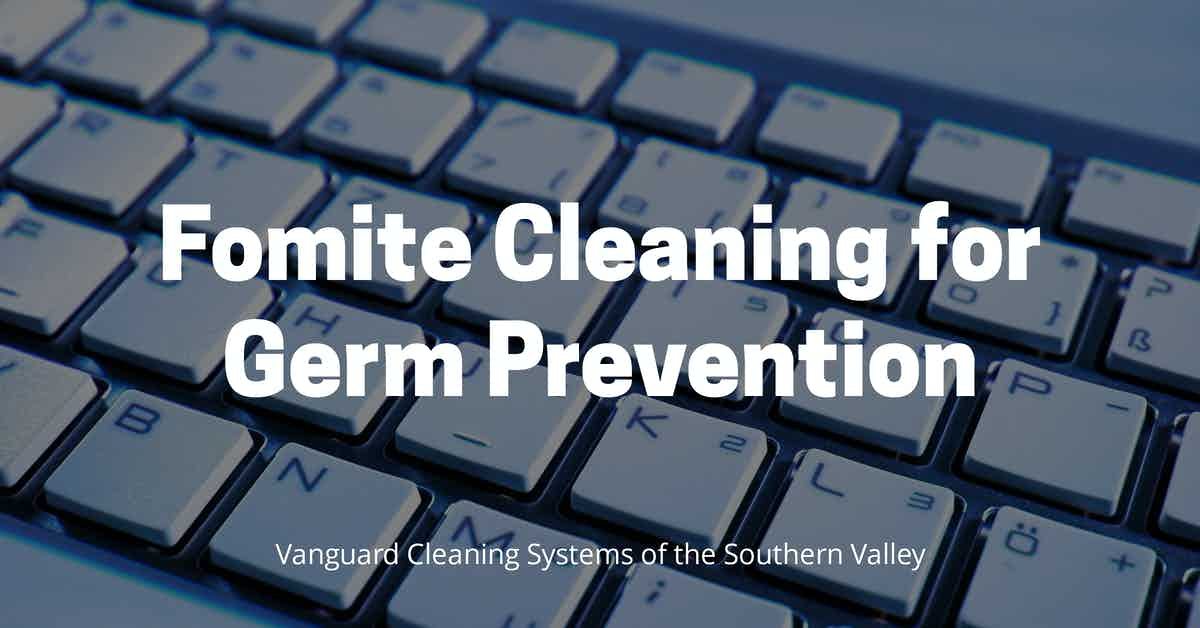Routine high touchpoint cleaning and disinfection services have been proven in repeated scientific studies to reduce the presence of illness-causing pathogens in offices and classrooms.

Fomites and the Path of Destruction
Thanks to the recent coronavirus outbreak, touchpoint or germ hot spot cleaning and disinfection are household terms.
The official term for these commonly touched homes for germs and bacteria tied to the spread of nearly every common disease known to humanity is fomites.
A fomite is defined as:
n. An inanimate object or substance that is capable of transmitting infectious organisms from one individual to another.
n. An inanimate object capable of carrying infectious agents (such as bacteria, viruses, and parasites), and thus passively enabling their transmission between hosts, or;
n. Any inanimate object (as a towel or money or clothing or dishes or books or toys, etc.) that can transmit infectious agents from one person to another.
A 2007 study published by the American Society of Microbiology identified hand to fomite contact as, potentially, the most common method of germ transmission among humans.
A majority of respiratory viruses are enveloped (parainfluenza virus, influenza virus, RSV, and coronavirus) and survive on surfaces from hours to days.
In contrast, most enteric viruses are nonenveloped and survive on fomites from weeks to months.
Studies have demonstrated that viral transfer from hands to surrounding surfaces is possible in 7 out of 10 viruses reviewed.
Epidemiological studies have verified naturally occurring outbreaks for 8 out of 10 viruses (HAV, RSV, norovirus, rotavirus, influenza virus, coronavirus, astroviruses, and adenoviruses).
Investigations of disease outbreaks and disinfection intervention studies have documented indoor surfaces as reservoirs for pathogenic viruses with potential spread of infectious disease.
Epidemiological studies have also identified fomites as a potential vehicle for disease transmission.
The study concludes that the presence and transmission of pathogens can be reduced through a combination of surface disinfection and hand hygiene.
Hygiene and disinfection intervention studies have demonstrated two concepts that support transmission of viral infection via fomites.
First, proper cleaning of hands decreases respiratory and gastrointestinal illness.
Second, disinfection of fomites can decrease surface contamination and may interrupt disease spread (norovirus, coronavirus, and rotavirus).
Significance of Fomites in the Spread of Respiratory and Enteric Viral Disease
Preventing Germ Transmission in the Office and Classrooms
The conclusions of the 2007 co-authored study published by the American Society for Microbiology was substantiated by a subsequent 2019 study that set out to determine the efficacy of occupational wellness intervention programs in the workplace and their impact on detectable viral loads on fomites and occupant hands.
According to Science Direct;
Viral transmission was monitored by applying an MS2 phage tracer to a door handle and the hand of a single volunteer participant.
At the same time, a placebo inoculum was applied to the hands of four additional volunteers.
The purpose was to evaluate the concentration of viruses on workers' hands and office surfaces before and after the OWI.
Results showed that the OWI significantly reduced viable phage concentrations per surface area on participants' hands, shared fomites, and personal fomites with an 85.4% average reduction.
Reduction of virus concentrations on hands and fomites is expected to subsequently minimize the risk of infections from common enteric and respiratory pathogens.
Impact of a hygiene intervention on virus spread in an office building
References & Resources
- Fomite Transmission : Route Specific Information : Infection Control
- Virus transfer between fingerpads and fomites
- Prevalence of Human Parainfluenza Viruses and Noroviruses Genomes on Office Fomites
Takeaway
Occupational wellness intervention programs that emphasize hand hygiene and routine fomite cleaning and disinfection throughout the day have been shown to significantly reduce the presence of enveloped and non-enveloped pathogens in the office and classroom.
Typically, implementing the programs requires a fundamental reframing of the importance of personal hygiene--being the need for thorough hand hygiene, especially after using the restroom--and an adjustment to cleaning regimens that focuses on facility occupation and use, as opposed to cleaning at a specific date and time.
A proven and cost-effective method for ensuring the highest standards of cleanliness and safety is outsourcing daily and specialized custodial services to an experienced service provider.
If you would like more information regarding the effectiveness of high-performance infection prevention and control measures, or if you would like to schedule a free, no-obligation onsite assessment of your facility's custodial needs, contact us today for a free quote!
In Bakersfield CA, call (661) 437-3253
In Fresno CA, call (559) 206-1059
In Valencia CA, or Santa Clarita CA, call (661) 437-3253
In Palmdale CA, or Lancaster CA, call (661) 371-4756

